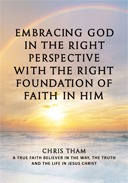
 |
Christian writer Tham examines biblical truth from an unusual array of angles encompassing prophecy and science. He has thoughtfully included ideas from the world's great religions, encouraging "interfaith dialogue." In the book's opening chapter, two questions are posed and answered: "Who Is God and Who Are You?" Tham asks if readers would prefer living in a heavenly palace guarded by angels, or in a "wooden village cottage" among close family. Most readers, he suggests, would choose the latter, even believing as they have traditionally been taught that earthly existence can lead to sin and eternal punishment. Yet both homes are open for occupancy. All humans are created by God in his image, and all have earthly parents and birthplaces. Similarly, mankind is connected to the earth as a carbon-based creation (dust).
Tham has clearly designed his book as a teaching tool with numbered and bulleted segments and colored fonts for emphasis. His unique perspective draws from other religions, especially Islam, with its special relation to Christianity. For example, Tham can accept that the spirit of God could utilize reincarnation for his purpose and believes that the teachings of Eastern sage Lao Tzu contain "nuggets of truth." Tham also refutes many commonly held church beliefs, such as the need for water baptism, since so many in the Bible were converted en masse, with no ritual required. Readers easily follow the author's well-considered thesis from the book's initial questions to its final, significant assertions: the world will not end, and Christ will return to transform mortal earth into a new, immortal realm where all humans will dwell in him. Tham's refreshing approach to Christian theology provides rich material for workshops and individual contemplation among both the newly converted and longtime, staunch adherents wishing to revitalize their faith.